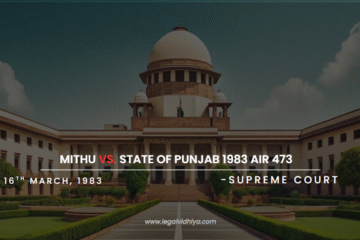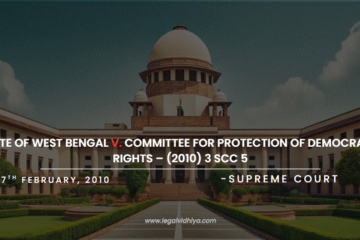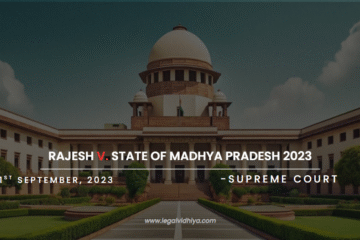| Citation | AIR 1973 SC 106 |
| Date of Judgement | 30.10. 1972 |
| Court | Supreme court of India. |
| Petitioner | Bennett Coleman & Co. Ors. |
| Respondent | Union Of India |
| Bench | SIKRI, S.M. (CJ) RAY, A.N. REDDY, P. JAGANMOHAN MATHEW, KUTTYIL KURIEN BEG, M. HAMEEDULLAH |
Introduction: –
This case deals under the freedom of press. In this case it was clarified that freedom of press is also one of the most important fundamental rights of the citizen. Everyone has equal rights to express their opinion because under the Indian constitution it is considered as the fundamental right of the people.in this case Article 19 (1) (a) of the constitution plays an important role under which freedom of speech and expression is guaranteed.
Facts of the case: –
- In this case the petitioners were media conglomerates who are involved in the publications of the newspaper.
- The petitioner was filed against the import policy of Newsprint.
- They challenged the order under Import Control Order 1955 and the way this is used by newspapers under the Newsprint order 1962.
- The petitioner filed the case because the government has imposed the restriction of not publishing more than ten pages in the newspaper.
- The increase in number of pages may not be more than 20% for newspapers that are under ten pages.
Issues raised in the case: –
- Whether or not petitioners were being firms may contravene the basic rights?
- Whether Article 358 of the constitution was challenged?
- Whether the restriction imposed by the order of Newspaper Import Control 1955 was a violation of Article 19(1) (a) of the constitution?
- Whether the newspaper policy can fall under the Import, Management Order 1955 was valid or not?
- Whether the clause 3 or 3A of the order of Newspaper Order, 1962 were Offensive of Article 14 and Article 19 (a) of the constitution?
Contentions: –
- Contention by petitioner: –
- The petitioners claimed that the Newsprint Control Policy of 1972 and 1973 violated their right to free speech and expression, which they exercised through their editorial staff and the publication medium.
- According to the counsel of petitioners the policy of 1972-73 authorized a 20% increase only for daily newspapers of less than 10 pages. It was argued that these were discriminatory quota newspapers with 10 or more pages and thus infringed Article 14. It was argued that there was a disparity in the entitlement of newspapers with an average of more than 10 pages compared to newspapers with 10 pages or less was based on no reasonable classification.
- Mr. Nani Palkhivala argued that the newsprint policy was really a policy of ‘newspaper control’; and contended it to be a subtle and sophisticated device to control newspapers. The Import Control Act and the Import Control Order are violated by a newspaper control policy. The 1935 Act’s Entry 19 on List 1 could provide Parliament the authority to regulate imports.
- It was argued that Article 358 is inapplicable because it has no application to the law or executive action taken prior to the proclamation of emergency. The Newsprint Policy was said by the petitioners to be a, continuation of the old newsprint policy which had originated earlier and continued from year to year for a decade till the proclamation of emergency in 1971.
- The petitioners argued that the policy outlined in Remark V will reduce circulation rather than increase it and that the government’s newsprint policy did not fall under clause 5(1) of the Import Control Order 1955, and it was therefore invalid.
- The petitioners contended that equating the large English daily, which are in a class by themselves, with smaller dailies that require fewer than 10 pages disproves an equitable distribution and demonstrates the treatment of dailies in an unreasonable manner.
- According to the petitioners, quotas are not granted on the basis of actual circulation but rather on the basis of notional circulation, which means the actual circulation of 1961-62, with permissible increases year after year, even if the actual circulation does not correspond to the permissible circulation on which the quota was based year after year.
- It was asserted that the common ownership units were unable to change the newsprint quota given to each of them because of the second prohibition in Remark VIII of the Newsprint Policy. Using the newsprint quota of one newspaper owned by a common ownership unit for another newspaper owned by that unit is prohibited which was not the case earlier.
- Contention by the Respondent: –
- The Additional Solicitor General raised two pleas in demurrer. Firstly, it was claimed that the petitioners were corporations and thus could not invoke fundamental rights. Secondly, it was claimed that Article 358 of the Constitution precludes petitioners from challenging a violation of fundamental rights.
- Article 358 of the Constitution was invoked by the Additional Solicitor General to raise the bar to the maintainability of the petition. Nothing in Article 19 shall limit the state’s ability to enact laws or carry out executive actions that it would be competent to do absent the provisions of that portion while a proclamation of an emergency is in effect. Therefore, it was asserted on behalf of the government that the petitioners were not permitted to contest the 1972 and1973 newsprint policy while the state of emergency was declared.
- According to the Additional Solicitor General, the right to import and use newsprint is not a common law right. It was claimed to be a unique right protected by several statutes. The Imports and Exports Act of 1947, the Imports Control Order of 1955, the Essential Commodities Act of 1955, and the Newsprint Control Order of 1962 were cited in support of the proposition that if the petitioners asked for a newsprint quota, they had to follow the prescribed conditions. It was also stated that under Article 19 (1), the press would have no special fundamental right (a).
- The Additional Solicitor General argued that Article 19 (1) (a) was not violated by the newsprint policy. These were the arguments put forth:
The right referred to in Article 19 (1) (a) is not directly and immediately addressed by the newsprint policy.
The law’s subject matter, not its effect or outcome, is what determines whether it has been violated.
Although the right to freedom of speech and expression may be consequentially or incidentally restricted, Article 19 (1) (a) is not invoked if the impugned law or action’s primary goal is something other than freedom of speech and expression.
- The respondents argued that a law that merely regulates, even directly, press freedom is permissible if there is no infringement or denial of citizens’ fundamental rights. He relied heavily on American decisions to support his argument that the right of the press to free expression is of all citizens speaking, publishing, and printing in all languages, and that the grave concern for freedom of expression that allowed the inclusion of Article 19 (1) (a) is not to be interpreted as a command that the Government of Parliament is powerless to protect that freedom.
- It was argued that there should no’ monopolisation of that market, whether it be by the government itself or by a private licensee, because there should be an unrestricted marketplace of ideas where truth will finally win. The press is not at risk from any monopolistic combination harm.
- The respondent contended that, it is open to an unrestricted use of any form of paper so long as newspapers do not apply for newsprint. This would establish that there is no shortage of white printing paper.
- The Additional Solicitor General argued that the commercial side of the press did not have any exemptions and that any incidental restriction on circulation could not harm press freedom of expression.
Judgement of the case: –
The supreme court held that whatever restriction imposed by the government is not reasonable restriction under Article 19 (2) of the constitution and it violates the Article 19 (1) (a) which states about freedom of speech and expression. The Supreme court also stated that it is against the freedom of speech and expression which is also against the fundamental rights of the constitution. It also stated that the government has not treated the newspaper pages accordingly. The supreme court also stated that the limit of page also affects the income of print media because it is the main source of income of it, if state government limits the page than it at the same time it also limits advertisement also it will affect the source of income under which restrictions imposed by government is not reasonable.
Conclusion: –
To be conclude here, in this case the people who are belonging from the print media has raised their voice against the restriction that is imposed by government which is not reasonable because it violates Article 19(1) (a) of the constitution and impose the page limit which give adverse effect to their source of income. In judgement the court give the verdict that whatever the restriction imposed by the government is not reasonable as well as it also affects the fundamental rights.
References: –
https://indiankanoon.org/doc/125596/
This Case Analysis is written by SOMYA RAJAWAT student of Maharani Laxmi Bai Arts and Commerce College, Gwalior Madhya Pradesh.
Intern at legal Vidhiya.




0 Comments